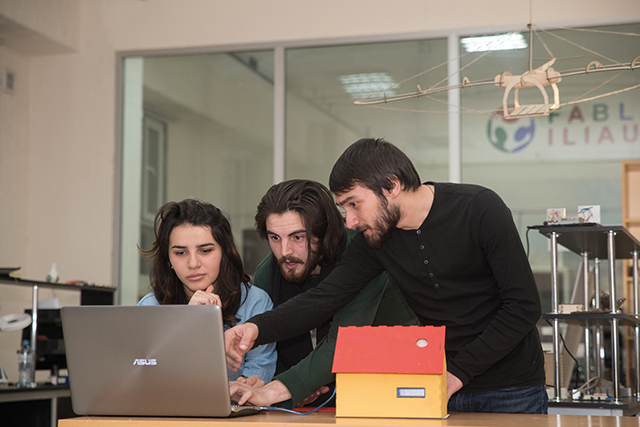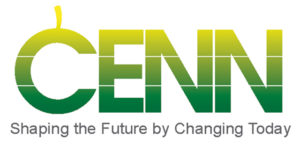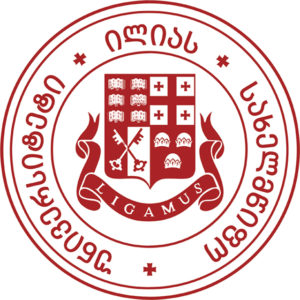Nowadays, entrepreneurship is a very topical issue and a priority for Georgia and the development of the country’s economy. However, unfortunately relatively less interest is devoted to its important aspects – social entrepreneurship and green entrepreneurship, which are vital for running a business without causing damage to nature, its resources and social justice. Green entrepreneurship itself is a new concept for the country, and it needs to be well learnt and understood by local entrepreneurs if we want to preserve one of the main treasures of our country: nature and its natural resources.
This year, as part of the EU-funded “EU4Youth: Social Entrepreneurship Ecosystem Development (SEED)” Project implemented by CENN, a Green Entrepreneurship course was added to the Bachelor program of the Business and Technology faculty of Ilia State University (Iliauni), a leading educational institution in Georgia. It is an important step to raise environmental awareness and share in-depth knowledge with youth about green social entrepreneurship.
Notably, Iliauni is the first educational institution in Georgia where such an important environmental issue, the Green Entrepreneurship Course, is being taught. Green entrepreneurship, or sustainable entrepreneurship that contributes to green growth, centres around entrepreneurship in a wider context in which the environment is the focal point. Green entrepreneurs strive to have a positive impact on the environment and try to mitigate environmental and social crises by creating business models addressing specific social and environmental issues. These entrepreneurs value both directions in their business models, creating innovative green products or services to boost demand for environmentally friendly production as well as increasing employability.
“We believe that changes start at a young age and its catalyst is awareness and education. With this in mind, CENN always actively supports Georgian educational system in order to raise awareness about environmental issues and connect new generation with cleaner and greener environment. Recently, we have been focusing on introducing the topic of circular economy and green and sustainable entrepreneurship at the universities of Georgia. This way, we are offering economic and business models to students which are considered in leading countries of the world as an impulse of sustainable development and green growth. In our consumer-driven world, the potentially harmful impact of products and services on the environment has too often been ignored, but the solution is to introduce innovative products, services and processes that protect the environment and ensure economic growth. CENN is pleased to contribute to this processes and introduce the green entrepreneurship practical course at the Ilia State University and to promote the topic among young people and future entrepreneurs,” said Nana Janashia, CENN Executive Director.
The course is being implemented in collaboration with the CENN program ‘EU4Youth: Social Entrepreneurship Ecosystem (SEED) Development for Green Growth, and the Ilia State University.
It is an important move for the development of the ecosystem and green and sustainable entrepreneurship in the country. Introducing such a course into the education system can be considered a great achievement for the country and a unique opportunity for local youth.
Although this innovative environmental initiative has only just been introduced, students have shown a great interest in the subject. Teaching of the new module began on March 15, and several lectures have already been conducted by invited lecturer Tea Mkheidze.
24 students have enrolled in the course so far. This is an elective subject and is intended for graduate students. Considering the current interest of students, it is expected that the number of youths interested in green entrepreneurship, and in undertaking this course, will significantly increase in the future.
The course consists of various elements to guarantee it will be interesting for students: interactive lectures, presentations, methods of demonstration, case analyses, methods of practical work, projects, team work and brainstorming.
The aim of the course is to teach students the basic concepts of green entrepreneurship, present opportunities for the development of green business ideas for solving environmental challenges, and develop skills to create a green startup. In summary, it shows the youth why and how to become a green entrepreneur and run their startups or businesses without posing harm to the environment, which is an urgent global problem today that must be solved with the joint effort of the global population.
According to Dimitri Japaridze, Dean of the Faculty of Business, Technology and Education at Ilia State University: “Our university is constantly striving to introduce innovative courses that address global and local challenges. Entrepreneurship is a priority for our country and we have been working to offer not just the general entrepreneurship course, but different directions of entrepreneurship to our students. In this regard, we were the first to start the social entrepreneurship and now the green entrepreneurship course in the academic system. Green entrepreneurship is relatively new and corresponds well to the existing environmental challenges and sustainable development goals. We were very pleased to cooperate with CENN; it was very fruitful and their expertise was important in forming the green entrepreneurship course. We believe that this course will significantly contribute to the formation of environmental leaders who will have the vision and skills to solve environmental challenges with innovative entrepreneurial ideas. Having green entrepreneurship taught at the university level will significantly contribute to the development of a green start-up ecosystem in the country.”
The main advantage of the new module is that it will change students’ perceptions of environmentally responsible entrepreneurship. The course, on one hand, significantly increases their knowledge of important environmental issues in relation with entrepreneurship, among them being green entrepreneurship; green innovation and the green economy; the environment and existing challenges; sustainable development; the circular economy and sustainable and responsible consumption of resources; waste management; climate change; renewable energy, water and sanitation; and smart cities and villages. On the other hand, the course provides the students with practical skills to start their own green startups with the focus on green startup idea generation and development, greening the business processes and assessing environmental impact, green business model planning and pitching, and green startup investment. The knowledge gained as a result of passing the course will be of great practical importance for their future activities.
At the end of the course, a DEMO day will be organized where students will have to pitch their green business ideas to a specially created jury. The jury will consist of academic staff of the business school and representatives of the green entrepreneurship ecosystem in Georgia as well as representatives of CENN.
It should be also noted that, within the framework of the partnership between CENN and Iliauni, reading materials were created in Georgian, which allow students to learn about the biggest challenges in the field of environmental protection and obtain information about entrepreneurship and green innovation. The reading materials include topics as climate change, circular economy, energy efficiency, social entrepreneurship and green innovation prepared by leading experts in the fields. In addition, the SEED project supports lecturers and provides them with international experience on green entrepreneurship learning methods.
“Through this project, we are strongly promoting the circular economy, resource efficiency, and eco-innovation among youth in order to empower them to tackle environmental challenges and boost economic growth,” says Alexandre Darras, Team Leader on Connectivity, Energy, Environment & Climate Change at the EU Delegation to Georgia. “We are happy that with the EU’s support, the first green entrepreneurship educational course will be introduced in Georgia and the students will be able to get acquainted with green business values to transform future business activities by integrating sustainable solutions.”

About the Social Entrepreneurship Ecosystem Development (SEED) Program
Rural youth in Georgia and Armenia today are challenged by a lack of inclusive educational opportunities, limited job opportunities, and an inability to meet the demands of the labour market due to mismatched skills and competencies.
The target communities in the geographically borderline regions of Ninotsminda, Gori and Akhmeta municipalities in Georgia, and Lori, Tavush and Shirak Marzes in Armenia, are affected by various dominant vulnerabilities, including extreme poverty, increased frequency of natural disasters, marginalized ethnic and religious minority groups, social conflicts, and more.
To confront this challenge, a program called ‘Social Entrepreneurship Ecosystem Development (SEED) for Green Growth in Borderline Communities’ is being implemented by CENN and its partner organizations, Green Lane NGO (Armenia) and the Kakheti Regional Development Fund (KRDF) with financial support from the EU, within the EU4Youth project.
Its main goal is to develop the entrepreneurial potential of young people from the EaP region in the field of social entrepreneurship, with the aim of contributing to social cohesion, employment, inclusion and reduction of inequalities.
Social entrepreneurship represents an important part of the economy. Green entrepreneurship, or sustainable entrepreneurship that contributes to green growth, centers around entrepreneurship in a broader context, in which the environment is the focal point. Green entrepreneurship, the realization of entrepreneurial ideas which have a positive effect on the natural environment, is fortunately becoming increasingly popular nowadays, helping entrepreneurs implement their ideas without harming the environment.
With this in mind, the organizers of the SEED project are working with local youth and vulnerable groups in the abovementioned borderline communities of Georgia and Armenia, actively cooperating with innovative centres, educational institutions, enterprises, etc., to inform the younger generation and increase their motivation to become future green innovators.
Furthermore, SEED also provides grants for young innovators so they can develop and implement projects supporting sustainable development.
By Ana Dumbadze

















